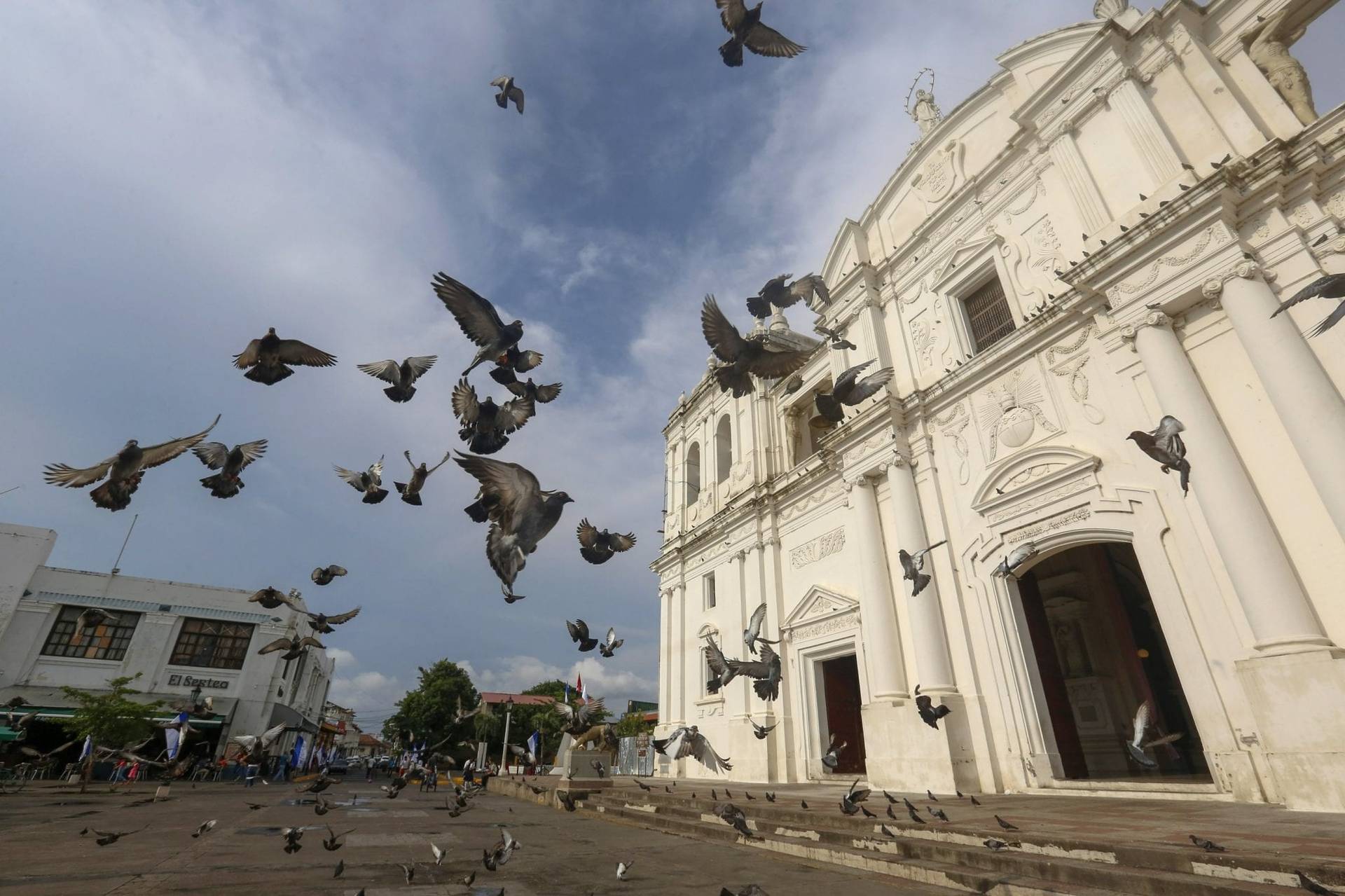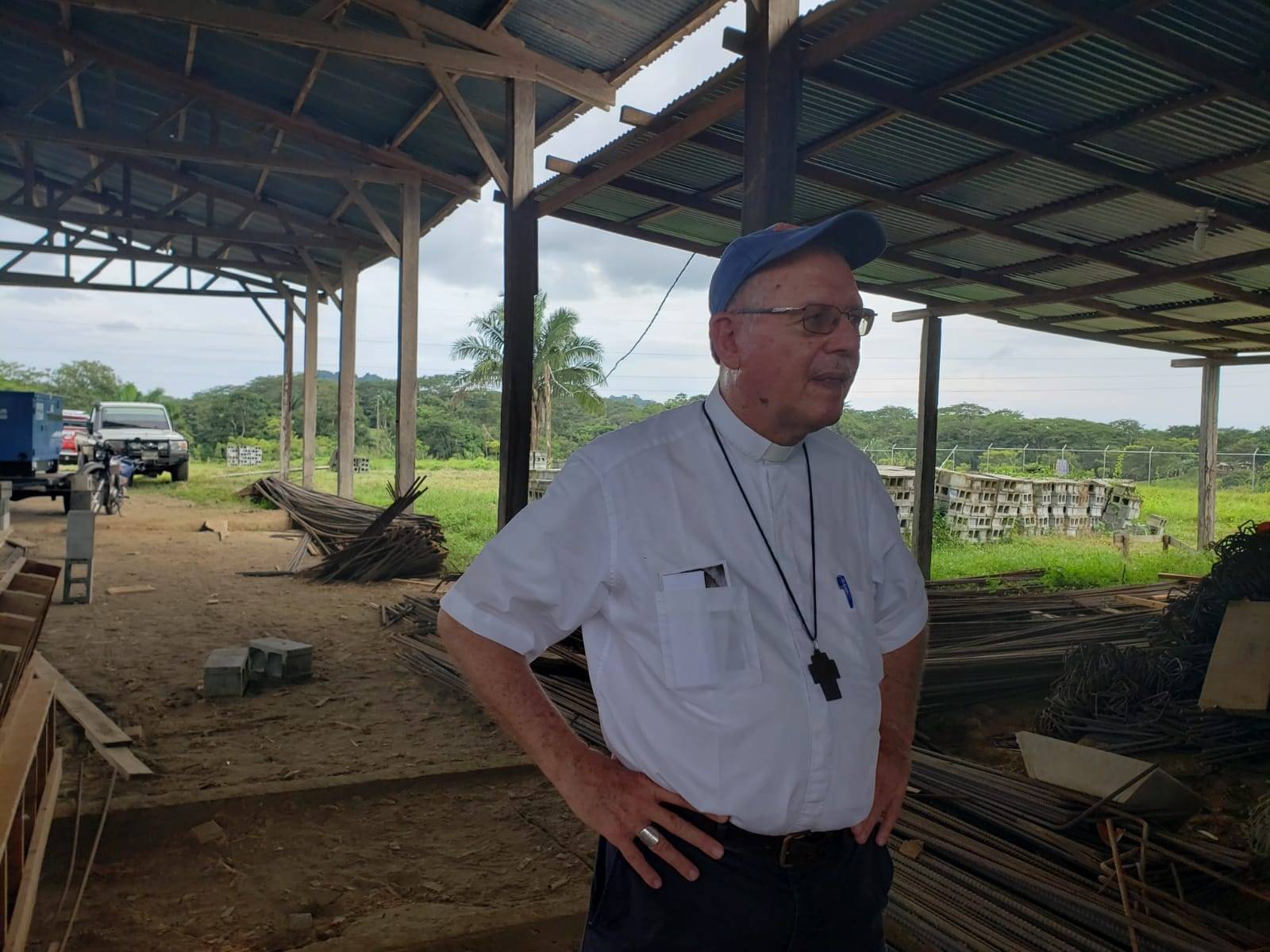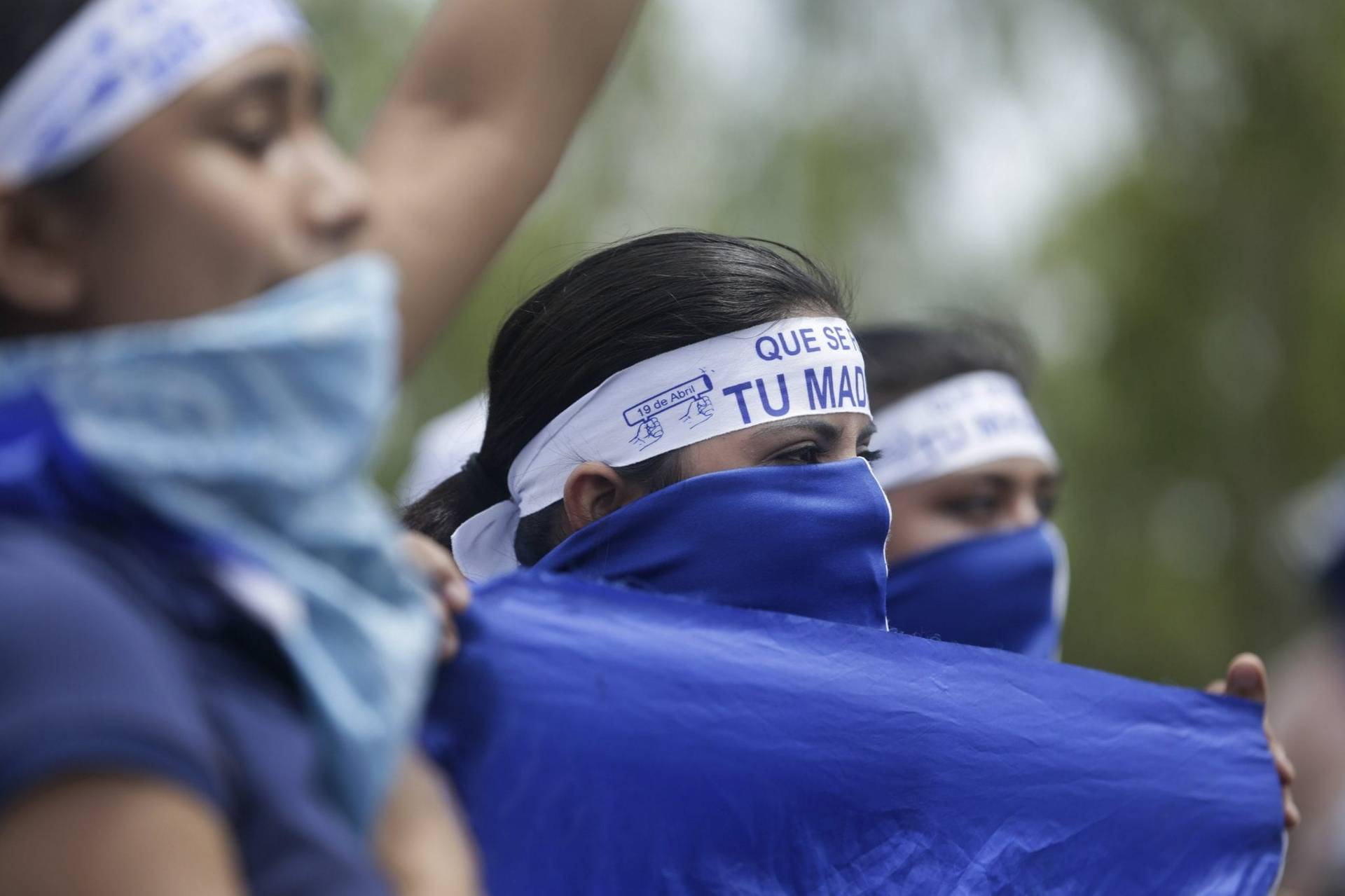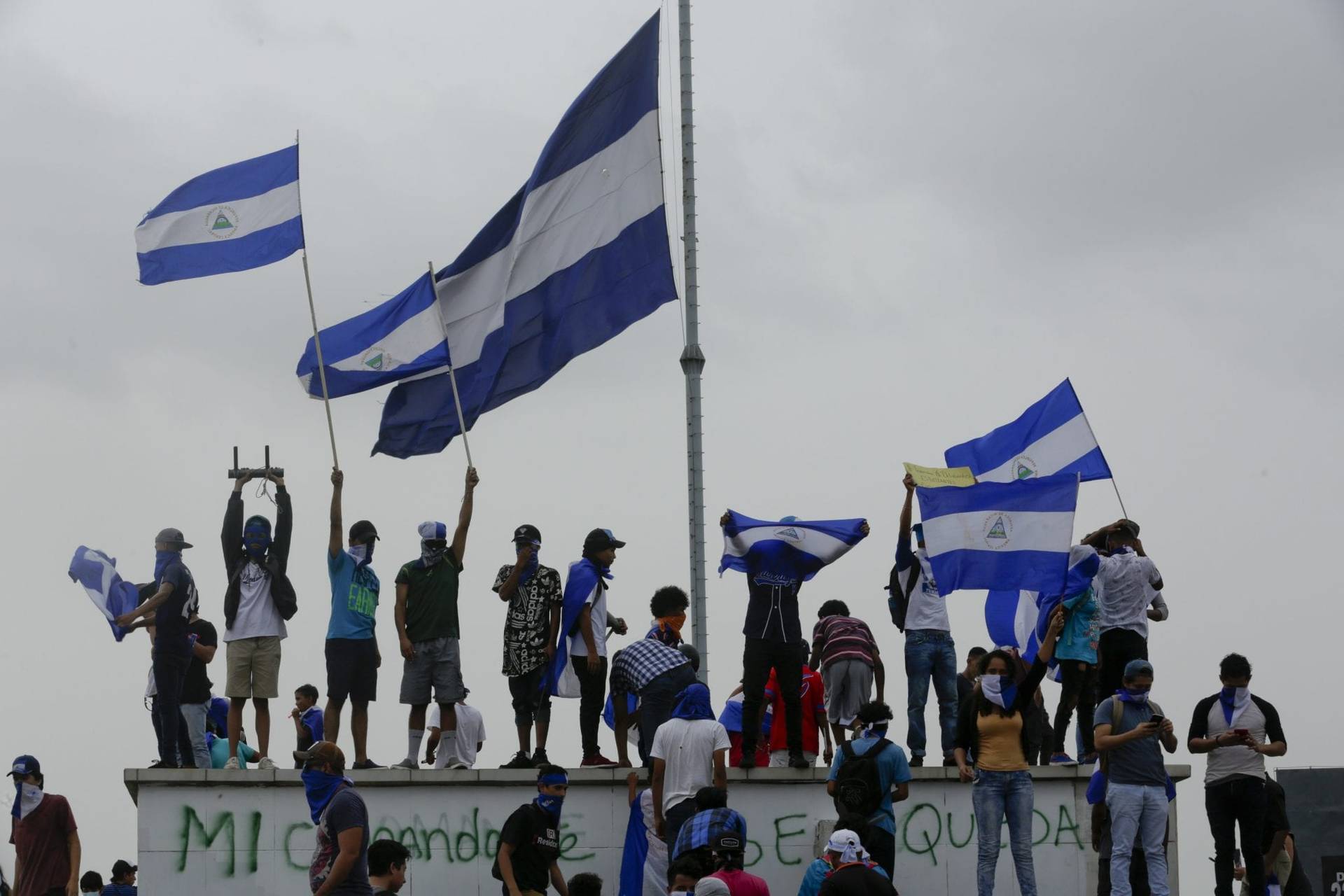MATAGALPA, Nicaragua — Bishop Rolando Alvarez is the shortest, youngest and newest bishop of Nicaragua, appointed in 2011 at the age of 44. Despite all that, or maybe because of it, he didn’t get a soft landing in his first gig.
Today, he leads Matagalpa, a diocese with 28 parishes that have 630 satellite communities, tended to by 54 priests and an estimated 60 religious women, 32 of whom are contemplative nuns who live in a convent. They’re growing so rapidly that in the words of the bishop, “if we have one new sister, we wouldn’t know where to put her!”
As he walks down the city of Sebaco, Alvarez is a rock star, with people stopping him in the streets to get a picture. Never mind that in Managua, the capital, people have been sent to prison in recent months for posting on Facebook a picture of themselves with a priest who’s under government surveillance.
At the end of May, pro-government forces in Sebaco burned a center of the papal charity Caritas, two blocks away from the local church of the Immaculate Conception of Mary, because it opened its doors to those wounded by paramilitary forces during the protests. To this day, bullet holes are visible in the walls of the church — which remains partially closed — with only a side door open when Mass is about to begin.
The local priest was forced to put metal bars on the other doors, to make it easier to go into lockdown if people are hiding in the church.
“We became a prison, but to guarantee we can keep the faithful safe,” he said.
Today, the bells of the church no longer call people for Mass, but to warn that something bad is happening. The parish became the center to care for the wounded and the priest’s house a hospital, because the public hospital had the order of not receiving people wounded in the protests.
The Diocese of Matagalpa also has 84 seminarians, and they’re expecting 40 young men to enter the propaedeutic seminary next year. His goal is to have two priests in each parish in the next 24 months, and after that, he wants his priests to be missionaries, something he said Nicaragua desperately needs.
Alvarez has been part of a group of bishops trying to mediate a dialogue between the government of Daniel Ortega and his wife, vice-president Rosario Murillo, and virtually every other actor in society, from the elderly to students, including business owners and bankers.
An estimated 68 percent of the country today disapproves of the Ortega regime, which first came into power in 2006 and has been re-elected twice since: They’re due to remain in power until 2021. However, the improvised coalition that forms the opposition wants them out now.
According to sources on the ground, the ongoing revolt against the Sandinista government was initiated by the party’s youth, who couldn’t take the embarrassment of being “bought off” anymore. An attempt by the government to change the pension system was the match that lit the fire, and though there’s more than one answer as to what has fueled the conflict since, there are several things everyone, including Alvarez, agree on, including the fact that deep down, the fight of those against the government is in favor of democracy.
“The government today controls the four powers,” Alvarez said on Nov. 22, meaning the executive, the legislature and the judiciary, as well as the economy. “That’s not a democracy.”
The crisis that began in April has left a permanent imprint in the Diocese of Matagalpa, that had 17 tranques, meaning blockages set up by people opposing the government, mostly youth. Through the Church’s intervention, all the roadblocks were lifted without the government using force, as it did in other cities, leaving a death toll estimated at 532 people.
Still, some 20 people died in Matagalpa during the violence.
Today, the diocese has five offices of “human rights,” a new ministry set up in September in honor of St. Pope John Paul II who fought Communism and human rights violations in his native Poland.
The offices were set up for people to file official complaints of human rights abuses that the Church then sends to the Inter-American Commission for Human Rights, which formed lay people and priests to serve in them.
Among other things, the information collected helps people who want to ask for political asylum, or who are stopped at the border either in Mexico or the United States, or because they want to apply for refugee status.
An estimated 500 people have been imprisoned by the Ortega regime since the protests began, and hundreds have “disappeared.” In addition, thousands have migrated, with Costa Rica hosting an estimated 30,000 people alone. According to a recent study from the privately-owned Nicaraguan Foundation for Development, two in ten people have fled the country since April.
“Our youth and our great professional minds have all left,” he said.
Alvarez said that the government today is “watching” over the human rights offices, but so far hasn’t taken any direct action. He believes this is because the goal of the offices is to collect information and send it abroad. They don’t make public allegations over plausible human right violations within Nicaragua.
He said that this new ministry became necessary after priests would continuously receive victims of human rights violations recounting what had happened to them. Today, the government is “persecuting those who helped the protesters, the medical personnel who tended to the wounded, those who took part in the tranques and those who fed them.”
Many people from the government infiltrated the protests, he said, reiterating a claim made by many of his brother bishops, and today, he said, even among daily Mass-goers there are people who chose the party, FNLS, above religion.
“The political project lacks values, it doesn’t have a vertebral spine sustaining it,” Alvarez said. “In addition, a person could have grown up in a family that didn’t form him or her in civic, moral and religious values.”
“On top of that, there’s our own mea culpa, because we didn’t form [followers] in social doctrine. We talked about Christ as the head of the Church, but not as its body too. So, the crisis found Catholics who’ve had a personal encounter with Christ, who receive the sacraments, but without a lack of proper formation in the faith, they chose politics and accused the Church of organizing a coup.”
Many of those who turned against the Church, Alvarez said, are now coming back, going to confession and admitting to having falsely accused the bishops of organizing a coup. This, he said, “presents us with the challenge of reconciliation.”
The prelate also gave examples in which the priests and the Church were in support of non-violence, calling both sides to dialogue. Once, a Sandinista young woman who went into a tranque ready to shoot was stopped by priests on hand, who also prevented those in the tranque from retaliating.
Another sign of the life of the diocese, Alvarez said, is the eight radio stations that serve the entire community.
“We went from announcing to denouncing,” Alvarez acknowledged, saying that the prayer intentions mutated from “so and so who has lung cancer, to so and so, who’s disappeared, or who is in prison, or who had her son killed in the protests.”
Only three of the stations have the legal permits to operate, and the government refuses to grant any to the others. Alvarez knows this means they could easily be shut down, but at the same time, some would argue the government doesn’t want to pay the political cost of doing so.
“After April 18, Nicaragua is a different country,” the bishop said. “The government suffered a stroke that they didn’t expect, because their own people revolted and the rest of the nation followed.”
Though one of the demands of the dialogue efforts is for the Ortega-Murillo duo to leave, Alvarez acknowledges that finding their replacement will be challenging.
Speaking for himself, and not on behalf of the bishops’ conference – which has acted as a united front throughout the crisis – Alvarez said the Church has to help ensure the next person to become president has “values.”
“This is a challenge,” he said. “We didn’t look for this, God is our witness, we unexpectedly became protagonists and we ourselves are surprised by this. But it’s our moral duty to make sure that the next person to take power has values.”
“The Church has to be attentive and speak up, not only because we’ve become a persecuted, bloodied church, but because for decency with ourselves, we have to help find a better person,” he said.
He believes that Nicaragua today needs to be “re-founded” and he’s confident in the people, who are capable of being “resilient, practical, focused on surviving,” who will leave space to peaceful co-existence.
If the Ortegas remain in power until 2021, Alvarez said, “they will leave a country in a havoc, and this is what we want to avoid.” That’s not paramount to a coup, he insisted, but “thinking about the people who are suffering and who will continue to suffer.”
Though the bishops are committed to mediating a solution to the crisis, Alvarez believes Catholics outside of Nicaragua can play a key role.
“We need prayers. We’re praying like crazy, because we believe this is a spiritual battle, but we need for the world to pray for us too, not to forget Nicaragua,” he said.
“I can’t say this enough: We need for the world to pray for us. Do you pray for Nicaragua?” he asked.












